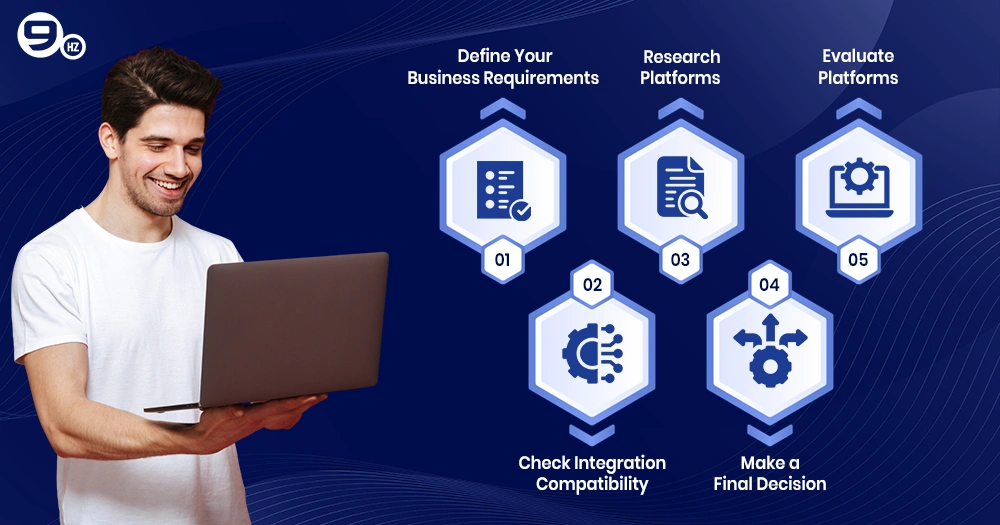Worldwide, consumers spent $1.2 trillion over the holiday period last year; US sales grew 4% to $282 billion (Salesforce). The eCommerce market has grown bigger than we imagined. With the rapid rise of online shopping, every business wants to reach its audience instantly. Undoubtedly, the best eCommerce platforms are helping them turn their dreams into reality.
Modern platforms like Shopify’s Now Live, CommentSold, and Videeo embody the ‘4S’ approach—Streaming, Scrolling, Searching, and Seamless Shopping—to help businesses grow and engage their target audience. Mobile conversion is also on top, as mobile gadgets led to $842 billion in sales worldwide and $195 billion in sales in the US.
Technology giants such as Google are also reshaping the industry, in addition to dedicated platforms. For example, Google’s Shopping tab introduced a new AI feature that recognizes your fashion idea and suggests similar options. So, you can also leverage similar AI-driven strategies to set your brand apart in numerous ways.
But wait!
Do you have an online store?
If not, developing it now in a multitude of ways is easy.
Curious about the top ecommerce platform to build your next store?
Through our research, we made it simple. This blog will walk you through the best options, from premium to free e-commerce platforms.
So, are you ready?
Let’s explore!
What is an eCommerce Platform?
The eCommerce platform refers to the software platform or solution that enables everyone to create their online store. These platforms offer features and tools that a business can utilize for storefront customization, inventory management, product catalog creation, payment processing, and more. In addition to the basic features, the provided additional features are security, marketing tools, analytics, reporting, and app integration.
These platforms fall into three key categories:
- SaaS (Software-as-a-Service) Platforms: These are cloud-powered and fully hosted platforms that do not require coding knowledge. For example, Shopify ecommerce.
- Open-source Platforms: These are free platforms that anyone can use and customize. However, setup requires technical knowledge. For example – Magento(Adobe Commerce)
- Headless Commerce Platforms: A platform that separates front-end and back-end is called a headless commerce platform. For example- BigCommerce.
Overall, e-commerce platforms provide the required infrastructure and foundation to start your business online. Want to know what these are?
Let’s continue with this blog!
The 20 best eCommerce Platforms
So, now we are ready to read the eCommerce platform list. However, you might be wondering how we picked these platforms.
While curating this, we consider the following factors:
- User-friendliness
- Features
- Pricing
- Ratings & reviews
- Integration capabilities
Discover the list of top 30 eCommerce platforms as follows:
| Name | Shopping Cart | Product Pages | Ease of Use | Pricing |
|---|---|---|---|---|
| Actinic | Yes | Yes | Hard | Monthly plans from £99/mo. – £1,999/mo. |
| Aptos Retail | Yes | Yes | Very Hard | By Quote Only |
| Shift4Shop | Yes | Yes | Easy | Free, unlimited plan fully scalable to enterprise |
| 1ShoppingCart | Yes | Yes | Easy | Monthly plans from $59/mo. – $249/mo. |
| 1&1 | Yes | Yes | Easy | Monthly plans from $14.99/mo. – $69.99/mo. |
| AmeriCommerce | Yes | Yes | Easy | Monthly plans from $24.95/mo. – $299/mo. |
| WooCommerce | Yes | Yes | Easy | Free WordPress Plugin |
| VTex | Yes | Yes | Very hard | Monthly plans from $500/mo. – $4,500/mo. |
| Zoey | Yes | Yes | Easy | Monthly plans from $299/mo. – $699/mo. |
| Volusion | Yes | Yes | Easy | Monthly plans from $29/mo. – $299/mo. |
| Big Cartel | Yes | Yes | Easy | Monthly plans from $9.99/mo. – $29.99/mo. |
| Weebly | Pro plan and higher | Yes | Easy | Yearly eCommerce plans from $144/yr. – $456/yr. |
| Shopsite | Yes | Yes | Easy | Monthly plans from $5.99/mo. – $59.99/mo. |
| Ashop | Yes | Yes | Easy | Monthly plans from $25/mo. – $249/mo. |
| Vendio | Yes | Yes | Hard | Monthly plans from $29.95/mo. – $249.95/mo. |
| Storenvy | Yes | Yes | Easy | Monthly plans from $14.99/mo. – $29.99/mo. |
| Simvoly | Yes | Yes | Easy | Monthly plans available from $18/mo. – $199/mo. |
| Shopify | Yes | Yes | Easy | Monthly plans from $29/mo. – $299/mo. |
| SiteCube | Yes | Yes | Easy | Single annual plan available at $59/yr. |
| SamCart | No | Individual, unconnected product pages with individual checkout |
Easy | Monthly plans from $49/mo. – $199/mo. |
| GoDaddy | Yes | Yes | Easy | Only one eCommerce plan at $19.99/mo. |
| BigCommerce | Yes | Yes | Easy | Monthly plans from $29.95/mo. – $249.95/mo. |
| Fortune3 | Yes | Yes | Hard | Monthly plans from $9.95/mo. – $159.95/mo. |
| CoreCommerce | Yes | Yes | Moderate | Monthly plans from $19/mo. – $600/mo. |
| EkmPowershop | Yes | Yes | Easy | Monthly plans from £29.99/mo. – £499.99/mo. plus VAT |
| Quick eSelling | Yes | Yes | Easy | Free plan, Paid plan starts from $199/mo. |
| GoECart | Yes | Yes | Moderate | 2 monthly plans at $1,000/mo. and $1,600/mo. |
| PinnacleCart | Yes | Yes | Moderate | Monthly plans from $44.95/mo. – $199.95/mo. |
| HostGator | Yes | Yes | Hard | Dependent on eCommerce platform choice |
| Miva Merchant | Yes | Yes | Moderate | Monthly plans from $79.95/mo. – $1,495/mo. |
| Infusionsoft by Keap | Yes | Yes | Hard | Monthly eCommerce plans from $399/mo. |
| Nexternal | Yes | Yes | Hard | Monthly plans from $79/mo. – $259/mo. |
| Network Solution | Yes | Yes | Moderate | Monthly plans from $29.95/mo. – $99.95/mo. |
1. Shopify
One of the top choices of entrepreneurs and eCommerce development service providers around the world is Shopify. It is an all-in-one platform that offers everything you need to launch your online store, enhance your brand image, and keep your customers’ experience seamless. Small businesses and large enterprises can manage and optimize their business with a single click.
Shopify allows businesses to sell their products through omnichannels such as social media, marketplace, and others. In person, you can use Shopify POS to sell your products directly to customers.
Best for: Small to medium businesses, dropshipping
Free Trial: Yes
Cost: Starts at $29/month (standard plan) and goes up to $2000+/month(Shopify Plus for large enterprises)
| Pros | Cons |
|---|---|
|
|
|
|
|
|
|
|
2. BigCommerce
Like Shopify, BigCommerce is one of the best e-commerce platforms and has a presence in over 120 countries. Top brands like Skullcandy, Ben & Jerry, and Revelry are examples of using the BicCommerce platform for their e-commerce needs. In addition to web hosting and customization options, this platform offers features like SEO tools, product listing, multichannel selling, and more.
Its headless commerce capabilities separate it from other platforms. This refers to the decoupling of front-end and back-end. For example, you can customize the user interface whenever you want instead of applying changes or modifications to your entire e-commerce store.
Best for: B2B sellers, international sellers, and large-scale businesses.
Free Trial: Yes
Cost: Starts at $29.95/month and custom price for large-enterprise
| Pros | Cons |
|---|---|
|
|
|
|
|
|
|
|
3. Magento(Adobe Commerce)
If you are looking for the best e-commerce platform designed for businesses of all sizes and that supports high-level customization, Adobe Commerce(formerly Magento) is the right choice. It is a robust and feature-rich ecommerce platform that suits all needs, from simple to complex ones. Magento stands out as a distinctive eCommerce platform with tools such as business intelligence, inventory management, shipping solutions, and order management.
Unlike other platforms such as Shopify, Wix, and WooCommerce, Adobe Commerce(Magento) doesn’t offer themes, and you need to rely on e-commerce developers for design.
Best for: B2B sellers, large enterprises, brands looking for full customization
Free Trial: No
Cost: open source version is free, excluding hosting, extension, and development; Adobe Commerce Cloud starting price is $22,000/year
| Pros | Cons |
|---|---|
|
|
|
|
|
|
|
|
4. WooCommerce
WooCommerce is the top e-commerce platform among free e-commerce platforms. It is based on WordPress technology, and you can turn any WordPress website into an e-commerce store by integrating the WooCommerce plugin free of cost. Most basic plugins are free, but third-party paid plugins are available at different prices on the Woo Store if you need advanced functionalities.
It is the best option for small businesses and beginners. However, setting up hosting and store settings requires expertise.
Best for: Content-driven stores, WordPress users, small businesses
Free Trial: No
Cost: The core plugin is free, but other costs, such as hosting, domain name, SSL certificate, and third-party e-commerce plugins, are required.
| Pros | Cons |
|---|---|
|
|
|
|
|
|
|
|
5. Wix
Wix is an intuitive website builder and one of the best e-commerce platforms. It allows users to create high-quality and creative e-commerce websites. With over 500+ templates, Wix optimizes websites for SEO and mobile devices. Users can access the Wix App Market, which offers powerful web apps for customization. It also provides customizable templates to create a fully customized storefront.
Best for: Small businesses, creative artists.
Free Trial: Yes
Cost: basic plan starts at $27/month
| Pros | Cons |
|---|---|
|
|
|
|
|
|
|
|
6. NopCommerce
There is nopCommerce for every type or size of business, including small and medium businesses, enterprise businesses, and global businesses. It is also considered one of the best e-commerce platforms for quickly launching your online store. It offers features like built-in payment and shipment services, SEO tools, multi-vendor and multi-store functionality, limitless customization opportunities, regional law support, and more.
Best for: Medium to large businesses, Global businesses, enterprises with multi-vendors and multiple stores.
Free Trial: No trial required, free for download
Cost: Free, other expenses like hosting, NopCommerce developers hiring cost, premium plugins cost
| Pros | Cons |
|---|---|
|
|
|
|
|
|
7. Squarespace Commerce
Are you in the creative e-commerce business and looking for an extraordinary option to create your online store? Squarespace is the name. For artisans and creatives, it is the top e-commerce platform. The platform provides a drag-and-drop website builder and options like website design, domain hosting, online store-building tools, SEO tools, and more.
Similar to WooCommerce, it is also a CMS. A single subscription allows you to create a website, host content, register a custom domain name, sell products, track analytics, and more.
Best for: Creatives, artists, small businesses,
Free Trial: Yes
Cost: Business plan starts at $23/month
| Pros | Cons |
|---|---|
|
|
|
|
|
|
|
|
8. PrestaShop
PrestaShop is an open-source e-commerce platform with 1 million+ members. It allows you to build a fully customized e-commerce store. One of the best parts about this platform is that you’ll completely own the online store and its data. PrestaShop supports almost all key payment gateways, such as PayPal, Stripe, etc.
Small to medium-sized companies would find PrestaShop a great fit because of its easy-to-use interface, customizability, and wide range of features.
Best for: Small and medium-sized businesses with technical expertise
Free Trial: No trial is required
Cost: Open source and free of cost, hosting and premium extensions require costs.
| Pros | Cons |
|---|---|
|
|
|
|
|
|
|
|
9. Weebly eCommerce
When it comes to finding a free ecommerce platform, Weebly is the right choice. The platform provides access to businesses for website design customization and valuable tools to scale your business. The beginners can build their online store without cost with Weebly eCommerce using 15+ free themes. However, a price is associated with custom domain names and hosting.
Best for: Small businesses and beginners
Free Trial: N/A, for basic use free plan is available
Cost: Professional plan starts at $12/month(if paid annually)
| Pros | Cons |
|---|---|
|
|
|
|
|
|
|
|
10. Big Cartel
BigCartel is an e-commerce platform designed for artists and makers. It offers a straightforward, user-friendly platform with essential features, perfect for small-scale artists and creators who want to start their online business. One of the most significant advantages of BigCartel is that it offers more e-commerce features than the other best e-commerce platforms. Although it is free to use, pricing increases with the number of products.
Best for: Artists, Creatives, and small businesses
Free Trial: free basic plan
Cost: Premium plan starts at $15/month
| Pros | Cons |
|---|---|
|
|
|
|
|
|
|
|
our Ecommerce Success Starts Here
Schedule a Free Consultation with Our Experts
11. Shift4Shop
Shift4Shop is another top e-commerce platform for building a feature-rich e-commerce store and making everything seamless for a business, from product listing to customer management. With Shift4Shop, you can create your store using any of dozens of professionally designed templates, customize your site, and access a myriad of powerful features.
Best for: US-based merchants, sellers who want to avoid transaction fees
Free Trial: Free plans are available only for US businesses
Cost: $0/month (free plan with Shift4 Payments) to $229/month for advanced plans.
| Pros | Cons |
|---|---|
|
|
|
|
|
|
|
|
12. Volusion
Volusion is an ecommerce platform that simplifies online store creation, product sales, and business scaling. It offers customizable themes, a reliable onboarding process, and a subscription system. However, the platform lacks blogging and upselling features. Using Volusion, it is easy to integrate 30 payment gateways. Providing various tools for creating an online store without complexity makes it one of the perfect choices for ecommerce development.
Best for: Data-driven businesses
Free Trial: Yes
Cost: Premium plan starts at $29/month
| Pros | Cons |
|---|---|
|
|
|
|
|
|
|
|
13. OpenCart
Among the best e-commerce platforms, OpenCart is an open-source platform that allows businesses to create online stores. You can create multiple stores and manage them all using a single dashboard. Its capabilities, such as powerful store management, SEO, various extensions and themes, and dedicated customer support, set it apart.
Best for: Small to medium businesses, Multi-store businesses
Free Trial: No trial restriction, free for all
Cost: Core platform is free for use, Cloud solutions start at $34.95/month
| Pros | Cons |
|---|---|
|
|
|
|
|
|
|
|
14. CoreCommerce
Designed with simplicity and customization in mind, CoreCommerce provides tools empowering companies to increase their online sales and simplify their operations. Its own payment gateway, CoreGateway, provides a user-friendly interface so businesses can track and monitor their payments in real time. Some of CoreCommerce’s top features are virtual terminal, customer vault, detailed reporting, invoicing, and more.
Best for: Small and medium-sized businesses
Free Trial: Yes
Cost: Basic plan $0, premium plans start at $35/mo.
| Pros | Cons |
|---|---|
|
|
|
|
|
|
|
|
15. Ecwid
Like WooCommerce, Ecwid is another free commerce extension allowing sellers to sell products online using a WordPress website. With Ecwid, sellers can also expand their reach by selling on marketplaces like Amazon and eBay and on social media platforms. The best part is that you don’t require any technical expertise and can use it for in-person selling using POS.
Best for: Small businesses, beginners
Free Trial: N/A, forever free plan up to 10 products
Cost: starts from $21/mo(venture plan) and goes up to $89/mo(unlimited plan)
| Pros | Cons |
|---|---|
|
|
|
|
|
|
|
|
16. Sellfy
Want to sell your content, such as eBooks, PDFs, music, digital arts, or more, through e-commerce? Sellfy is your platform. It is an all-in-one platform for creators who can sell their digital products and merchandise online. Sellfy’s key features are email marketing, affiliate channel creation, upselling, and creative store customization.
Best for: Content creators
Free Trial: Yes
Cost: Starts at $29/month
| Pros | Cons |
|---|---|
|
|
|
|
|
|
|
|
17. PinnacleCart
PinnacleCart is another best e-commerce platform designed to prioritize customer experience and compatibility with all devices, from mobile to desktop. It is a complete e-commerce and mobile-ready platform. The platform offers impressive features such as cart abandonment, remarketing, and predictive search.
Best for: B2B Businesses, Mid-sized stores
Free Trial: Yes
Cost: Customized pricing
| Pros | Cons |
|---|---|
|
|
|
|
|
|
|
|
18. Bluepark
Bluepark, a UK-based e-commerce platform, offers web hosting, order fulfillment, payment processing, multi-currency support, inventory management, SEO friendly, unlimited bandwidth, and full HTTP support. Its B2B and multi-channel selling features make it one of the top choices for developing an online e-commerce store and the best e-commerce platform in the UK.
Best for: Primarily for UK-based businesses
Free Trial: Yes
Cost: starts at £29.99
| Pros | Cons |
|---|---|
|
|
|
|
|
|
|
|
19. Sylius
Sylius is an open-source headless e-commerce platform offering numerous features for B2C and B2B e-commerce businesses. Most Sylius users are mid-market and large-scale companies. One of its prime qualities is its ease of hosting and scaling, making it one of the best e-commerce platforms.
Best for: Headless commerce requirements, mid and large-scale businesses
Free Trial: N/A
Cost: Core platform free, Sylius Plus available at 800€ / year
| Pros | Cons |
|---|---|
|
|
|
|
|
|
|
|
20. SAP Commerce
SAP is a large software firm that makes solutions of the highest quality available for managing supply chains. Its solution for digital commerce drives growth for all types of businesses, including business-to-consumer, business-to-business, direct-to-consumer, and others. A further advantage is that the eCommerce platform, which includes a point-of-sale (POS) system, can accommodate extremely complicated scenarios while still providing outstanding performance and high scalability.
Best for: Global enterprises and large-scale businesses
Free Trial: No
Cost: Custom pricing
| Pros | Cons |
|---|---|
|
|
|
|
|
|
|
|
How to Choose an eCommerce Platform
There are a variety of e-commerce platforms available, offering a myriad of options to develop your online store. But when it comes to making a final decision, most entrepreneurs are stuck at one point—where to start?
So, following the steps mentioned below can save you time in deciding on the best e-commerce platform that aligns with your needs.
1. Define Your Business Requirements
If you know your business needs, half the battle is already won. However, if not, define them first. Later, they will help you decide on the right platform.
Research Platforms
The next crucial step is researching the platforms. While research considers the following factors:
Ease of use
- Mobile readiness
- SEO capabilities
- Integrations compatibility
- Customization
- Scalability
- Cost
- Features offered
- Support & maintenance
3. Evaluate Platforms
Almost all platforms offer a 15-day trial period, and some even work as free e-commerce platforms that offer basic features for $0. So, you can use them for evaluation before purchasing their premium version.
4. Check Integration Compatibility
Carefully assess the platform’s integration capabilities, such as what kind of payment gateways are supported, whether apps that match your business needs are available, and whether the platform supports API integrations.
Make a Final Decision
The last thing you need to check is the scalability and growth potential of the platform you’ve chosen for developing your e-commerce store. Once you find all things satisfactory, go ahead and purchase the e-commerce platform plan.
The most vital step is creating an implementation plan. It will guide you through making the final version of your next online store. The best way to do this is to hire an e-commerce development company with proven experience. Their expertise will help you develop your store using the right approach, saving you time and money.
Conclusion
The eCommerce industry is skyrocketing, and there are 30.7 million eCommerce websites or stores, and the numbers keep growing. Customer demands have shifted towards more innovative options, so keeping up with these is challenging for a business. The best e-commerce platforms mentioned in this blog can help you gain a competitive edge in the fierce competition.
You only need to choose the right one for yourself, and we, as a leading e-commerce development company, can help with that. At NineHertz, we guide our clients through every step—from consultation to deployment—tailoring solutions to their specific needs. We have a proven track record in providing cost-effective e-commerce solutions to global businesses using the latest technology.
We hope you have all the details about the best e-commerce platforms you are looking at to decide which one suits your needs. When are you planning to launch your business online?
FAQs
1. Which platform is best for eCommerce?
It is hard to predict without analyzing exact needs, as every e-commerce platform excels at offering diverse features. For example, if you are a beginner, Shopify or WooCommerce is the best. However, if you are a large-scale enterprise and want more customization, your choice should be BigCommerce or Adobe Commerce.
2. What are the e-commerce platforms?
eCommerce platforms are software solutions businesses use to develop their online store, eCommerce app, or eCommerce website. The key categories of these platforms are:
- Hosted Platforms(SaaS) such as Shopify, Wix eCommerce
- Self-hosted Platforms(Open Source) such as WooCommerce, Adobe Commerce
- Niche Platforms like Squarespace, Big Cartel, and Sellfy
3. What is the top e-commerce platform in the US?
Shopify is considered one of the top e-commerce platforms in the US, and its competitors are WooCommerce, BigCommerce, Wix, and Squarespace.
4. What’s the best eCommerce platform to start?
Things depend on your needs, such as whether you are a complete beginner, whether Shopify is the right option, whether you need just an e-commerce plugin for your website, whether WooCommerce is the best, and so on. Still, if you are unable to decide, you can connect and share your requirements with us anytime. Once we analyze your needs, we’ll reply, suggesting the best option and a detailed e-commerce development plan for your business.
5. Who is better than Shopify?
Shopify is an all-in-one platform, but still other best ecommerce platforms also exist, such as:
- For scalability: BigCommerce
- For customization: WooCommerce/Adobe Commerce
- Best free option: WooCommerce or Ecwid
Great Together!















